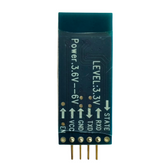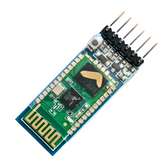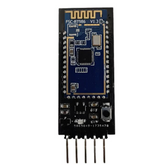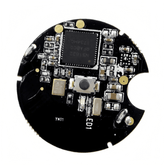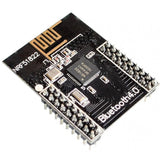Bluetooth Modules: Unleashing the Power of Wireless Connectivity
Summary
Discover the transformative potential of Bluetooth Modules in our latest blog! Delve into an enlightening Introduction that sets the stage for a journey into the realm of wireless connectivity. Uncover the remarkable Features of Bluetooth Modules, from seamless pairing to energy efficiency. Explore real-world Applications, from smart homes to healthcare, where Bluetooth technology is revolutionizing industries. Don't miss the CONCLUSION for insights on the future of wireless innovation. Click to unlock the power of Bluetooth Modules and embrace a wire-free future!
Introduction
Bluetooth technology has revolutionized the way we connect and communicate wirelessly. It's a wireless communication protocol that allows devices to exchange data over short distances using radio waves.
At the heart of this technology are Bluetooth modules, which act as the interface between devices and the Bluetooth network.
These tiny electronic components are responsible for establishing connections and enabling seamless communication between a wide range of devices, including smartphones, computers, IoT devices, and more.
Bluetooth modules operate on specific frequencies within the 2.4 GHz range, providing reliable, low-power, and secure wireless connectivity.

Bluetooth modules are the driving force behind the wireless revolution, enabling seamless connectivity between various devices.
They have become integral components across numerous applications and industries, allowing for unparalleled convenience and flexibility.
By eliminating the need for physical cables and connectors, Bluetooth modules have transformed the way we interact with technology, making it easier than ever to share data, stream audio, and control devices remotely.
Bluetooth Module Features
Bluetooth Version Compatibility
One of the key features of Bluetooth modules is their compatibility with different Bluetooth versions, such as 3.0, 4.0, HC05, and HC06.
Each version comes with its own set of functionalities and data transfer rates, allowing users to choose the most suitable module for their specific needs.
For example, Bluetooth 4.0 modules are designed for low-power applications, making them ideal for wearable devices and IoT sensors, while Bluetooth 3.0 modules offer higher data transfer rates, perfect for streaming audio or video.
Transmission Range
Bluetooth modules have varying transmission ranges, typically spanning from a few meters to up to 100 meters, depending on the specific module and environmental conditions.
This range allows for seamless connectivity between devices within a reasonable proximity, making Bluetooth modules suitable for a wide range of applications.
Factors such as obstacles, interference, and environmental conditions can affect the transmission range, so it's essential to consider these factors when selecting a Bluetooth module for your project.
Power Consumption
One of the most significant advantages of Bluetooth modules is their energy-efficient operation, which extends battery life and reduces overall power consumption.
Modern Bluetooth modules are designed with low-power consumption in mind, making them ideal for battery-powered devices and IoT applications.
Advancements in low-power Bluetooth modules have further improved their energy efficiency, allowing devices to remain connected for extended periods without draining their batteries quickly.
Interface Options
Bluetooth modules offer a variety of interface options, such as UART, SPI, and I2C, which facilitate easy integration with microcontrollers and other devices.
These interfaces enable seamless communication between the Bluetooth module and the host device, allowing for efficient data transfer and control.
By choosing the appropriate interface option, developers can ensure compatibility with their existing hardware and software ecosystems, streamlining the development process and reducing integration complexities.
Security and Encryption
Data privacy and security are crucial considerations in wireless communication, and Bluetooth modules address these concerns through secure pairing and encryption capabilities.
These features prevent unauthorized access and ensure that sensitive information transmitted between devices remains confidential.
Bluetooth modules employ advanced encryption algorithms and authentication mechanisms to establish secure connections, providing peace of mind for users and ensuring the integrity of their data.
Multi-Point Connectivity
Many Bluetooth modules support multi-point connectivity, allowing a single module to connect with multiple devices simultaneously.
This feature enables versatile and flexible applications, such as connecting a smartphone to both a headset and a smartwatch, or a computer to multiple peripherals.
Multi-point connectivity enhances the user experience by enabling seamless device switching and reducing the need for constant reconnections, making Bluetooth modules a convenient choice for modern applications.
Profile Support
Bluetooth modules support various Bluetooth profiles, such as Audio, Human Interface Device (HID), and Serial Port, among others.
These profiles define the functionality and communication protocols for specific types of devices and applications.
By supporting multiple profiles, Bluetooth modules can be tailored to meet the unique requirements of different applications, ranging from audio streaming to data transfer and device control.

Applications of Bluetooth Modules
Wireless Audio Streaming
One of the most widespread applications of Bluetooth modules is in wireless audio streaming.
From headphones and speakers to car audio systems, Bluetooth modules enable seamless audio connectivity, enhancing the user experience and convenience.
By eliminating the need for cumbersome wires, Bluetooth audio streaming allows users to enjoy their favorite music, podcasts, or audiobooks with freedom of movement and without the risk of tangled cables.
Internet of Things (IoT) and Home Automation
Bluetooth modules play a crucial role in the Internet of Things (IoT) and home automation ecosystems.
They facilitate communication between smart devices within a home network, enabling centralized control and automation capabilities.
With Bluetooth modules, users can seamlessly connect and manage a wide range of smart home devices, such as lighting systems, thermostats, security cameras, and appliances, providing increased convenience and energy efficiency.
Wearable Devices
The integration of Bluetooth modules in wearable devices, such as fitness trackers, smartwatches, and healthcare monitoring devices, has revolutionized the way we track and manage our health and wellness.
These modules enable wireless data transfer and synchronization between wearable devices and smartphones or computers, allowing users to monitor their fitness activities, receive notifications, and access real-time health data with ease.
Industrial Automation
In industrial settings, Bluetooth modules play a critical role in enabling wireless communication between various components and devices.
They facilitate the connection of sensors, actuators, controllers, and other devices, enabling efficient data exchange and remote monitoring and control capabilities.
By eliminating the need for complex wiring and cabling, Bluetooth modules simplify the installation and maintenance of industrial automation systems, reducing costs and improving overall productivity.
Automotive Systems
Bluetooth modules have become an integral part of modern automotive systems, enhancing the driving experience and increasing safety.
They enable hands-free calling and audio streaming, allowing drivers to stay connected while keeping their hands on the wheel and their eyes on the road.
Additionally, Bluetooth modules provide wireless connectivity for in-car infotainment systems, enabling seamless integration with smartphones and other devices for music playback, navigation, and more.
Gaming Controllers
In the gaming industry, Bluetooth modules have revolutionized the way gamers interact with their consoles and games.
By providing wireless freedom of movement, Bluetooth-enabled gaming controllers enhance the gaming experience, allowing players to immerse themselves fully in their virtual worlds.
Bluetooth modules enable a seamless connection between gaming consoles and controllers, eliminating the need for cumbersome cables and providing a more enjoyable and uninterrupted gaming experience.
Proximity Sensing and Tracking
Bluetooth modules are widely used in proximity sensing and tracking applications, such as asset tracking and location-based services.
By leveraging Bluetooth technology, these modules can detect and communicate with nearby devices, enabling the implementation of beacon systems and proximity-based applications.
These applications have found widespread use in retail, hospitality, and logistics industries, providing valuable insights into customer behavior, inventory management, and asset tracking.
Wireless Data Transfer
In addition to their numerous applications, Bluetooth modules also facilitate wireless data transfer between devices.
Whether it's sharing files, exchanging contacts, or synchronizing data, Bluetooth modules enable cable-free data transfer, enhancing convenience and mobility.
By eliminating the need for physical connections, Bluetooth modules streamline the process of transferring data between devices, making it easier than ever to share and access information on the go.

Conclusion
Bluetooth modules have truly revolutionized wireless connectivity, becoming indispensable components in a wide range of applications and industries.
Their ability to establish seamless communication between devices, while offering low power consumption, secure data transfer, and versatile connectivity options, has made them a game-changer in the world of technology.
As technology continues to evolve, Bluetooth modules will undoubtedly play an even more significant role in our lives.
Advancements in Bluetooth technology, such as increased data transfer rates, extended ranges, and improved energy efficiency, will open up new possibilities and applications.
Moreover, the growing adoption of Bluetooth modules in emerging fields like the Internet of Things (IoT), smart cities, and autonomous vehicles will further cement their importance in our connected world.
In an era where wireless connectivity is becoming increasingly crucial, understanding and leveraging the capabilities of Bluetooth modules is essential.
Whether you're a technology enthusiast, a developer, or a professional in various industries, embracing Bluetooth modules can unlock a world of convenience, efficiency, and innovation.



